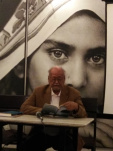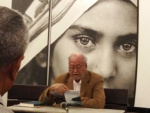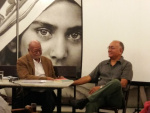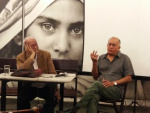Shuvashree Chowdhury's Blog, page 28
December 29, 2017
Random Thoughts: My Dire Need.
[image error]
Sharing random thoughts from a Facebook post of three years back, and a connected one further below from last night…
December 28, 2014
My Dire Need: My husband often tells me, sometimes embarrassedly, much to my impatience, that friends repeatedly ask him on reading my FB posts, if I’m alright and if all’s well with me. All I wish to convey, to my supposed well wishers out there via this post is, I am just as well, happy, or distressed as you or anyone else in this world. I do not write to vent my feelings, but to hopefully make a little difference to someone out there in the world who might be going through an anguish or experience I might have undergone at some time and am in a better position to appreciate.
Needless to say, I never preach what I have not undergone myself, or at least seriously thought about – thus my accompanying views with every post, however fanciful a quote, picture or words may appear to me. In fact, I never write about what I am going through in the present, but would have had to have that thought or experience at some time to be inspired to write about it. So much so that, I’ve posted on beauty and confidence building, humorous posts, sitting in my mother’s hospital room right after her 3rd stroke, when I was gripped with fear and anguish, that she would not make it through this time. Those who knew my condition then might again have thought I was going crazy to post such frivolity.
Also, after two decades of working and making myself productive every day of my life, now that I’m writing full-time which is a very lonely job and one which would take a long time to show result, I find the need to make myself productive to society in a small way, till I can do so in a larger way through the release of my subsequent book/work.
So my posts are my dire need to be of service to the community, however minutely, to feel useful in some way. But over and above, to keep my thinking cap on all the time and practice my writing skills, through delving into as diverse thoughts as possible, even as I slog page after page on my novel, over a single thought perhaps.
— Shuvashree
Three years later…December 28, 2017:
This Fb memory came up, just when I’m summing up all that I’ve written in the last decade! 

December 13, 2017
My new novel,’Entwined Lives’: An Excerpt from the Chapter – ‘Power Is the Ultimate Aphrodisiac.’
[image error]
Below is an excerpt from my upcoming novel, “Entwined Lives” – to be released in Jaunaury/February 2018. Please click on the photo of the book’s working cover (unfinished) to read the synopsis/blurb to understand the context of the excerpt.
I’m sharing this now, right after reading Salma Hayek’s story in this link: https://www.nytimes.com/interactive/2017/12/13/opinion/contributors/salma-hayek-harvey-weinstein.html?smid=fb-share
“But why do so many of us, as female artists, have to go to war to tell our stories when we have so much to offer? Why do we have to fight tooth and nail to maintain our dignity? I think it is because we, as women, have been devalued artistically to an indecent state, to the point where the film industry stopped making an effort to find out what female audiences wanted to see and what stories we wanted to tell.” – Salma Hayek.
Chapter 17 Power Is the Ultimate Aphrodisiac
Once on the stretch that led to the MRC Nagar main road, Sujata was relieved the traffic was still not heavy. She continued to drive with the car’s windows down, craving fresh air after the raging turmoil she had felt in the chilled luxury hotel room. Going over the events that had just transpired, Sujata wondered if there was anything she could have done differently, to prevent this revolting fiasco. After much thought, she concluded that there wasn’t, except for not going to his room alone, even if it was on business.
Whether it is sexual harassment, rape, or attempted rape, they are all about asserting power that demeans and threatens the victim’s self-worth and crushes their soul. It then leaves the mere ghost of the victim’s former self, to deal with the world’s accusatory fingers, and frail attempts to nail the culprit. This explained Sujata’s attempt at normalcy of behaviour in public, even after the atrocious outbreak.
Often, one will come across a man in power, chasing a woman whom he thinks he can win over with his seasoned charms, but if not, he will resort to persuasion and bullying. Such men cannot take ‘no’ for an answer, as it hurts their fragile egos. They have usually got all they’ve desired in life, and are used to having their way with women too often. And thus, they do not understand that when a woman says ‘no’ … she means so. A man who then stoops to sexually harass and bully doesn’t realise an unresponsive woman is not flattered by his interest, neither will she succumb however powerful or affluent he may be. She might be ashamed, humiliated by his undue attention. It takes moral strength and the nerves of steel to ward off a man with immense social power, more so if he is her superior at work or even her husband’s. A woman then cannot even easily talk about her predator to anyone, as she is blamed for how she looks or dresses, and might have acted to allure him.
Then even the law will ask a woman for physical proof of having been sexually harassed, which is more humiliating in recounting, let alone proving. Thus women, often in saving their dignity from further abuse, after already having had it crushed, tend to be quiet on the matter. How would they go about proving it, and who would believe them, they fear. Their well-meaning friends and families too will advise them not to take on such a powerful and socially respected man. Thus, Sujata was afraid no one would believe her! To make matters worse, in her case, she was not even sure if she could relate this incident to her husband, for fear he might blame her instead and make her feel cheap. How could she relate this to her parents or sister either? They would surely say it was her fault for going to the man’s room, knowing how he bragged of his escapades with women. Little would they understand that she had never imagined being the victim of a much older family friend she had known since her youth.
Sujata went over the last two meetings, when she had met him along with Anand. There was no way of telling he would turn out this way. She cursed herself repeatedly now for going up to his room. But this could have happened at any other place—in her office or his. You cannot be suspicious of the world at large, of all men all the time, Sujata judiciously concluded. Yet she was convinced that such issues need to be dealt with severely when they do arise, in an attempt to reduce the sureness and guts of such people. She would talk to him firmly. It’s just that she would first allow herself to heal from the blow and the resulting emotional fragility before doing so.
PS: To read the vividly sketched circumstances, the story, that leads to the end of the chapter in the excerpt I shared above, and more such intense stories in the lives of working women with aspirations, please get your copy of “Entwined Lives.” 
December 11, 2017
“I Never Wanted To Be A Poet”




A lovely, inspiring and heartwarming evening at the Prakriti international poetry festival session at Amdavadi, Chennai, yesterday, listening to reputed poet Jayanta Mahapatra talking about his poetry and reading his poems that ended with an autobiographical narrative that was so charming, after Allan Sealey had read his poems along with beautiful slides of depictions from the Mughal (Akbar) period. The evening, commenced with an introduction by Ranvir Shah, who compared today’s event to the show stopper sequel that you have in a fashion show to showcase the designers best work, by the best models.
I was much awed by Jayanta Mahapatra’s humility and charm, even after decades of prominence, over and above his sensitive, gems of poems, full of empathetic humanity, so aesthetically and delicately crafted. I could personally relate to many of the points he shared, as he chattily went about introducing himself to us, easing us into his poems.
“I never wanted to be a poet” he stated softly, yet emphatically, “I was a physicist…poetry came to me by itself when I was thirty nine.”
These lines, really gave me a deep sense of assurance, motivation and strength, just when I’m applying the final soft touches to my manuscript of a collection of 90 poems, titled ‘Fragments’ written over the last ten years, that is to be released along with the other 3 prose books by January. This is because, even I didn’t want to be a writer of any kind till I was 35 years, leave alone wanting to be a poet.
I wrote my first poem at 36 years, which actually washed up on me like a wave from the sea, barely a year that I’d moved to Chennai. Then the second poem got published in a collection of poems – taken from my blog with permission, without my submitting it anywhere. These first two poems go on to be the first poems of ‘Fragments.’
The part I loved best and could relate to most, about Mr Mahapatra’s overall communication was when he said, “Poetry taught me how to love people.”
I could relate rather well to his views, when he said, “I never wanted to settle outside my homeland, far from my people, in UK or USA, even though I had a lot of opportunity, as even my parents settled abroad later.”
In my case, ever since I was 20, and inspite of my parents encouragement to meet them, after I did, I rejected one NRI prospective groom after another, or those working abroad especially the US, as I was determined not to live abroad.
I just feel so blessed that I had the opportunity to listen to him today and feel strenthened, after I finally let go of the manuscript of Fragments, this afternoon, after clinging to it for years…till I got a firm reminder from the publisher today. Though I’m still going to be copy editing it with an editor for a while longer. It’s been very different for the novel and short stories, where I’ve been in a hurry from the start to let them go. 
On Firming My Worldviews As A Writer.
[image error]
Dear friends,
Sharing these facebook ‘memories’ and posts here further below with dates…As, if I’m preparing to release three of my books by next month, along with the republished version of the first soon and hoping you will read them, it is my responsibility to share with you, that I am trained and experienced over almost two decades, to disseminate alot of my views in the books, in addition to my insights from a lifetime of good reading. 
November 21, 2017
My Invested Feelings
[image error]
In the drizzle I look for your house,
The traffic is unruly, roads are in puddles:
I ask house guards, passers-by, for directions
Till I finally reach your grilled front gate
Through which I see your lined book shelves.
You’ve just gone out the guard tells me
So I persuade him to call you, since
I’ve tried to reach you in varied ways
But its silence you choose to deal with the hurt
From our fights over accrued differences.
But you refuse to return to meet me
Saying you’re with official guests,
Knowing I might never return to your gate
For we live far, at different ends –
And our paths had only by chance met.
My attempts to keep the communication alive
You take for granted, do not respect,
While making no similar effort yourself –
In nursing your wounded ego above all else,
As my feelings for you I struggle to conserve.
Can I pick my hurt feelings off your front stairs,
Knowing I’m now and then so tempted to recreate
What we once shared in someone else –
Who looks just like you and has your endearing traits,
My feelings that in you still remain deeply invested.
[image error]
PS: This poem is inspired by the movie ‘Shaadi Mei Zaroor Aana,” in the link below, that I just saw and loved, few days back with my mother in Calcutta, then came back home and scribbled in my notepad…it’s an initial draft:
https://www.youtube.com/watch?v=An4vqppEWXU
Rajkumar Rao has lately become my favourite Bollywood actor, especially after watching Newton last month and now this…he’s overtaken Irfaan Khan due to his natural acting who used to be my previous favourite.
–


November 13, 2017
The Path I Built
[image error]
The Path I Built…
In my search for light
that will illuminate my life,
also give me peace and quiet,
with a purpose that overrides strife,
I dreamt of a garden path
flowing over a stream of views
I have channeled lifelong,
out of many an uphill walk
at varied jobs,
in quest for the meaning
of my birth.
Little did I envision then,
the path I dreamt of
was the most arduous yet,
as it was guarded
by zealous gardeners
who only grew flowers
they could sell well,
whereas I nurtured my garden
with all good intent
to nourish and keep people
inherently well.
After many a crushing defeat
to walk the beaten commercial path,
when I was almost ready to give up,
I decided to build my very own path
which would take people
over a stream of thoughts and words
to a well manicured garden
where they could rest
their wearied minds,
recoup their inherent strength
to face the dilemmas of life.
PS: I just clicked these photos over my morning walk and I scribbled these lines sitting by the lake here with the chilly wind blowing on my face…Sharing it right away as I love spontaneity…Will edit it later at home to add to my collection.
November 12, 2017
My Life’s Vision…
[image error]
My Life’s Vision…
To create a picturesque,
meaningful
and fragrant garden
of thoughts and words
in my lifetime,
that will give wings to dreams
in the youth, that find solace
on branches of my views
even after my death:
To build a tomb
over green thoughts
of integrity
and strong character
for themselves,
in my name.
PS: 
September 18, 2017
Durga Puja: An Excerpt From My Novel ‘Across Borders’
[image error]
Wishing you all a Shubho Mahalaya today with an excerpt from my novel ‘Across Borders’ launched in Calcutta on Mahalaya (Oct 2013).
Chapter 3 – ‘The Home That Adopted Me’ (Page 71-74)
Every year during the Durga Puja, Ronjit uncle gave all
women of the extended-family a sari each. I wore mine with
a flourish, for the anjali or collective offering of flower and
prayers conducted by the priest on each of the five days.
With my ardour for dancing, I started the dhunuchi dance, in
offering to the deity. Taking the earthen pot with burning
incense by the handle, I brandished it gracefully. I danced
with agility in front of the goddess Durga and her four children
– Kartik, Ganesh, Lakshmi and Saraswati, to the beats of
the dhak, the traditional drums. My dance recital was well
appreciated by all and even today it is customary for the
students of the school to perform a collective dhunuchi dance
during Durga Puja. The temple where the Puja was
conducted was initially built of mud about two hundred years
back by our ancestors. It is currently a concrete building in
the central porch of the family’s homes alongside the river.
One year when I did not show up for the arati on Ashtami,
the second and important day of the Durga Puja, Ronjit uncle
stormed at his wife Mrinalini, “Where is Maya? Why is she
not dancing?”
“She cannot dance today,” Mrinalini crisply replied, close to
his ears.
“But, why not” Ronjit uncle retorted impatiently, “she is here
somewhere, I just saw her. So why can’t she dance?”
“Maya is here, but cannot come to the temple,” Mrinalini
replied firmly looking into her husband’s eyes, imploring him
to understand. But when there was no sign of his
comprehension, she added briskly “she is menstruating and
cannot come into the temple for the Puja.”
“What nonsense,” Ronjit uncle shot back at his wife, enraged.
“Ma” he said, in reference to Goddess Durga, “is a woman,
isn’t she? Then why follow these stupid customs restricting
her daughters to her presence? You people make a mockery
of womanhood and what Ma represents.”
I was summoned immediately. Mrinalini knew better than to
refute her husband’s wishes. In minutes, draped in the silk
sari Ronjit uncle had given me, I was at the temple dhunuchi
in hand. As I danced to the sounds of the dhaks that evening,
I mentally offered my arati to Ronjit uncle for his
broadmindedness and respect for women, for attempting to
liberate us from traditions imposed on us down the ages.
That morning he possibly also faced the reality that the little
girl he had brought with him five years back had come of
age and was now a woman. Ronjit uncle celebrated Durga
Puja fervently and lavishly, as he was in reality celebrating
Womanhood – the source of life, perhaps in memory of his
own mother who had died at childbirth. He lived his life trying
to fulfil his dream of the emancipation of women, especially
rural woman, starting at home with his own family.
This forward-thinking by a male was remarkable, considering
the position of women then, especially in rural India and
Pakistan. This was when a woman after childbirth was kept
in an outhouse, unable to participate in any activity in the
household. She was not allowed into the kitchen, let alone
cook during her menstrual cycle. A woman, according to
Ronjit uncle, should not have to feel restricted in any way by
her birth. I was to never forget his lessons on the equality of
women, without her needing to act like a man to prove it.
Not only did I live my own life by these doctrines, I would
also bring up my two daughters to think of themselves no
less than any son I might have ever had. One day by my
own initiation, my daughter would light her father’s funeralpyre
at a public crematorium. I would not permit my son-in-law
to do so, merely for being born male, while my daughters
and I stayed home.
Every year at Durga Puja, the new idol was worshipped
wearing Ma Durga’s personal set of real gold jewellery. She
and her children were adorned in them on Shasthi, the first
day of the puja. These were removed and safely put away in
a trunk before the immersion on Dashami, the last of the
five-day Puja, to be used the following year. Ma Durga was
draped in a new, red Benarasi sari every year, which was
then given to any woman in the family who was getting married
the following year, to wear at her wedding. The new bride
wore Ma Durga’s sari, like a daughter would wear her
mother’s on her wedding day. This was in order to invoke
the revered mother’s blessing to bestow on her strength and
good luck. Ronjit uncle had immense faith in the strength of
Ma Durga. He wished upon every woman to find that same
strength and power within herself, with the belief that all
women have an inherent potency, especially in times of crisis.
This was the axiom by which I would lead my life.
For us, it was not merely the celebration of Durga Puja and
womanhood, but of religious harmony during religious
turbulent times. We did not think of the Puja only on religious
lines, but as a coming together of all religions and cultures.
Many Muslims and Christians, both students and teachers
of the school as well as guests, attended the celebrations,
even if they did not take part in the prayers and rituals.
Everyone who attended was served a meal, which had been
consecrated as an offering to the Goddess. Though there
were special cooks to prepare the meals on all five days, we
students served. It was a fulfilling experience, as we
participated wholeheartedly in the festival. It brought
everyone together and was an opportunity to connect. In
my case also, with my estranged father and his second wife,
who came over a few times. Baba even offered to buy me a
sari once, wanting to take me to the local market, but I firmly
declined. I was not about to let him buy off his guilt on a
whim.
The Telegraph’s review of Across Borders is in the link: https://www.telegraphindia.com/113091...
Sharing the Mahalaya – Birendra Krishna Bhadra (Full) chants in the link : https://www.youtube.com/watch?v=iGClESAGmew
[image error]
PS: I took the photos last Pujo in Calcutta .
The significance of Mahalaya: http://indiatoday.intoday.in/story/wh...


September 8, 2017
Passing the Baton
On Passing The Baton Of “Borders” On To Stronger Hands 
July 24, 2017
An Adventure Of My Soul: ‘Entwined Lives’
[image error]
My views on writing precisely: “I have never claimed to create anything out of nothing; I have always needed an incident or a character as a starting point, but I have exercised imagination, invention and a sense of the dramatic to make it something of my own” — Somerset Maugham, in ‘A Writer’s Notebook.’
In the writing of my upcoming novel, Entwined Lives, I read and reread almost all of Maugham’s novels back to back and I only read him for the close to three years it took me to write this novel.
My characters, plots and subplots are all inspired by real people and incidents, but my detailed handling of their psyche is inspired by Maugham’s. The novel of his I was most inspired to base the mental workings of mine by are Mrs Craddock, Liza of Lambeth, and varied characters from ‘Razors Edge’, ‘Of Human Bondage’ and ‘Moon and Sixpence’
So though my novels plot, location and characters are contemporary, they have received historical and classical treatment.



